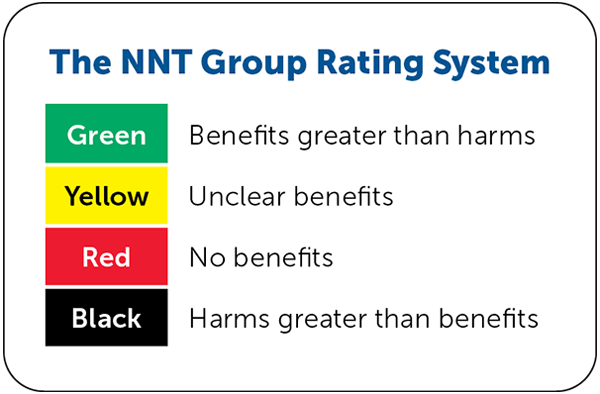
Am Fam Physician. 2016;93(7):552
Author disclosure: No relevant financial affiliations.


| Benefits | Harms |
|---|---|
| No patient-important benefits | No hospital admissions were prevented |
Details for This Review
Study Population: Patients two years and older with an acute asthma exacerbation, being treated with short-acting beta agonists and systemic corticosteroids
Efficacy End Points: Hospital admission, forced expiratory volume in one second (FEV1)
Harm End Points: Headache
Narrative: According to the Centers for Disease Control and Prevention, asthma accounts for 1.8 million emergency department visits and approximately 3,400 deaths annually.1 Despite these numbers, physicians have few options in the treatment of acute asthma if corticoste-roids, short-acting inhaled beta agonists, and magnesium have been ineffective. This review evaluates leukotriene receptor antagonists (LTRAs) as an additional treatment option in the emergency care setting.
This review included 1,940 emergency department patients with acute asthma, 470 of whom were children (two to 12 years of age).2 Intravenous and oral LTRAs were studied. No significant difference in hospitalization rate was observed in any group. A small statistically significant difference was noted in FEV1 improvement for oral zafirlukast (Accolate) and intravenous montelukast (Singulair; mean difference of 8% and 12% improvement from baseline FEV1, respectively) in adults only. This difference was not observed in children or in adults receiving oral montelukast. There was no difference in reported headaches for patients who received LTRAs vs. placebo.
Caveats: According to this review, LTRAs possibly improve FEV1 in adults, but they do not decrease hospital admission. This information may open the door for more studies, but it should not change clinical practice for several reasons. First, improvement in FEV1 is not a patient-oriented outcome. Also, all of the studies that showed improvement in FEV1 were analyzing it as a secondary end point (the primary end point was hospital admission). Finally, all studies of oral3,4 and intravenous5,6 LTRA therapy were published by a single principal investigator.
Although we need more options for patients with asthma if traditional therapies are ineffective, the data show that LTRAs do not appear to be a solution.
This series is coordinated by Dean A. Seehusen, MD, MPH, AFP Contributing Editor, and Daniel Runde, MD, from the NNT Group (theNNT.com).
A collection of Medicine by the Numbers published in AFP is available at https://www.aafp.org/afp/mbtn.
This review is available from the NNT Group at http://www.thennt.com/nnt/leukotriene-receptor-antagonists-treatment-acute-asthma/.
